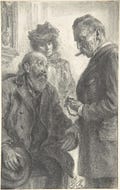When I was earning my graduate degree in bioethics, we applied different philosophical theories to understand and solve ethical dilemmas. Each theory has its advantages and disadvantages. For instance, utilitarianism is based on the idea that an ethical choice should be based on “the greatest good for the greatest number.” (However, you might ask, “What about the good of the others?” Or, “How do we know that the consequence of our choice will in fact lead to a good outcome?”) Another theory, deontology, is based on the idea of rules and moral laws. Unlike utilitarianism, deontology doesn’t determine the right choice based on consequences. (So, here you might ask, “What if following a particular rule or moral code results in a terrible consequence?”) These are just a couple theories, but the idea is the same: Ethical theories provide some useful ways for making decisions, but they also come with many limitations.
With my background in literature, I was drawn to an area of bioethics called narrative ethics. This area of bioethics was starting to gain traction as medical programs began integrating literature and the arts into their programs in the hope that they could help doctors expand their moral imagination and practice empathy. One article from the medical journal Annals of Internal Medicine outlines five goals of medical education and the study of literature:
1) Literary accounts of illness can teach physicians concrete and powerful lessons about the lives of sick people; 2) great works of fiction about medicine enable physicians to recognize the power and implications of what they do; 3) through the study of narrative, the physician can better understand patients’ stories of sickness and his or her own personal stake in medical practice; 4) literary study contributes to physicians' expertise in narrative ethics; and 5) literary theory offers new perspectives on the work and the genres of medicine.[i]
Narrative ethics approach medicine as an art and stories as part of the structure of medical knowledge. When a sick patient comes in to see a doctor, she tells her story first. The doctor listens and tries to make a good diagnosis. But if the doctor can’t listen to the story well, the doctor will fail to help the patient. It asks how trust is established, why emotions matter, what a patient’s story means, how to know the truth, and maybe most importantly, how to see the patient as a person with a story rather than as a body with a medical case.
This brings me to Walker Percy. While Percy is called a doctor–writer, he doesn’t say much about medicine itself as a practice. In Percy’s experience, he sees not just physical illness among westerners, but rather he diagnoses the rampant “modern malaise” characterized by alienation, despair, melancholy. He draws on his experience to see and confront the moral life that surrounds us.
Narrative ethics and literature teach us about the value of stories. They teach us that stories have real moral weight if we only take the time to listen and pay attention. In a world where stories no longer amount to enough entertainment, we see distractions abound and conversation becoming a lost art. There’s a whole moral life that surrounds us, with ways of knowing ourselves and others better and opportunities to make better choices, if we take the time to listen to the stories.
To Ponder
Where else can literature help us realize what it means to live more fully human? Can literature, for instance, help us better understand law and justice? Can it teach us to form political opinions from robust ideas like empathy, social harmony, morality rather than being led by influences of media?
What I’ve Been Reading
Book: The Christian Imagination: The Practice of Faith in Literature and Writing
[i] https://pubmed.ncbi.nlm.nih.gov/7887555/
Thanks for subscribing to A Holy Wonder. If you’ve enjoyed the newsletter or something in it resonated with you, I invite you to share it with others.





Fascinating read!